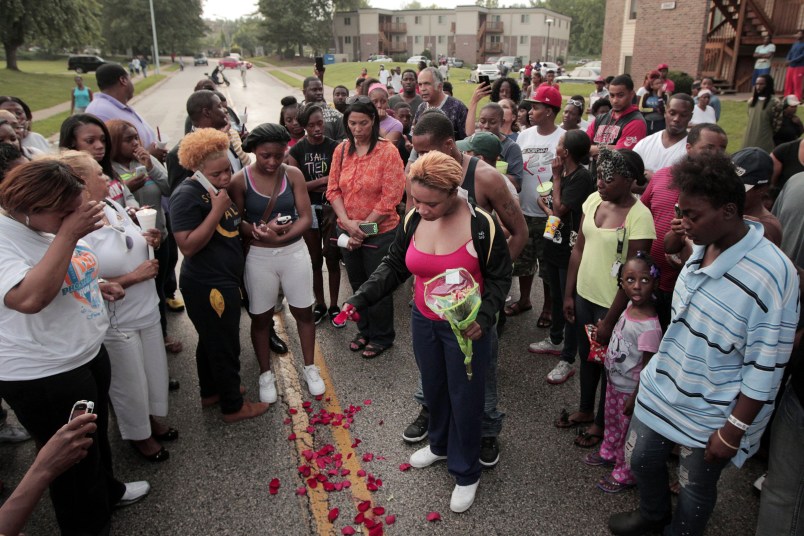In announcing Monday that Ferguson, Mo., police officer Darren Wilson would not be charged in the Aug. 9 death of Michael Brown, St. Louis County prosecutor Bob McCulloch provided the most detailed account yet of what led to the shooting and the shooting itself.
McCulloch emphasized that the grand jury had heard from witnesses who had not spoken to the press and reviewed the entirety of the physical evidence. “They are the only people who have heard and examined every witness and every piece of evidence,” he said.
This is the version of events that McCulloch gave Monday night while announcing the grand jury’s decision.
At 11:45 a.m. CT on Aug. 9, Wilson responded to a call at an apartment complex about an infant who was having trouble breathing. At 11:53 a.m. CT, Wilson heard a police radio broadcast about a convenience store robbery in progress.
Wilson left the apartment complex around that time and heard a description of the suspect, who was Brown. As Wilson was driving down the street, he encountered Brown and his friend. Wilson slowed or stopped his car and told them to move to the sidewalk. “Words were exchanged,” as McCulloch put it Monday, and Brown and his friend continued to walk down the street.
Wilson then radioed that he needed his assistance and backed up his car to block their path. An altercation then took place at the police car with Wilson seated inside and Brown standing outside the driver’s side window. Two shots were fired during that initial part of the altercation. The altercation was described as a “tussle” or “tug-of-war” by witnesses. Some said that Brown had punched Wilson. Wilson had some swelling and redness to his face after the shooting, McCulloch said.
Brown ran and Wilson chased him. Brown then stopped and moved toward Wilson, several more shots were fired and Brown was fatally injured. What happened between the altercation and the fatal shots varied some depending on the witness, McCulloch said.
Some witnesses said that Wilson fired at Brown as he chased him. Others said that Wilson did not fire until Brown turned to face him and moved toward him. One witness said that Brown went at Wilson at “full charge.” Most said that Wilson shot at Brown as Brown moved toward him.
Some witnesses said that Brown did not move toward Wilson and had his hands raised, but McCulloch said that “many” of those witnesses later admitted that they did not actually see the shooting. Some witnesses described Brown’s hands as raised, others said that they were in front of his chest or clenched in fists.
A total of 12 shots were fired. Brown was shot at least six times. The entire incident lasted less than 90 seconds.







Nothing I’ve heard indicates that the Prosecutor lifted a single finger to actually get an indictment. He went into the procedure reluctantly and with a strong preference to believe everything the cops told him.
Sad. Pathetic. Unjust.
I don’t have a problem with the fact that the Grand Jury did not return an indictment, but I do have a problem with the way the prosecutor went about this. As a former federal prosecutor, I indicted my fair share of people, and I never did it like this. First, I have never heard of a prosecutor presenting a Grand Jury with a bunch of possible charges and just leaving it up to the Grand Jury to decide which, if any, charges apply. A Grand Jury needs more guidance than that from the prosecutor, and, when a prosecutor actually wants to get an indictment, then the prosecutor provides that guidance. Second, I have never heard of the person who is the target of the indictment testifying before the Grand Jury. I would love to see the transcript of that testimony, because I’m betting there was no genuine cross-examination. I’m betting the officer was simply allowed to tell his story unchallenged by the prosecutor. Maybe there is not enough evidence to indict; I really don’t know. But what I do know is that this prosecutor never intended to get an indictment. They say you can indict a ham sandwich, which is basically true. If so, then this would have to be the most incompetent prosecutor in history, or perhaps the more reasonable explanation is that he wasn’t really trying to get an indictment.
Has everyone forgotten the big picture here. Michael Brown was a criminal, he had just robbed a store just before his confrontation with Officer Darren Wilson. It would have been just a matter of time before he would kill someone if he wasn’t stopped when he was.
The local officials and media have been preparing for this non indictment long before it was given.
So, all people who commit a crime eventually kill someone?